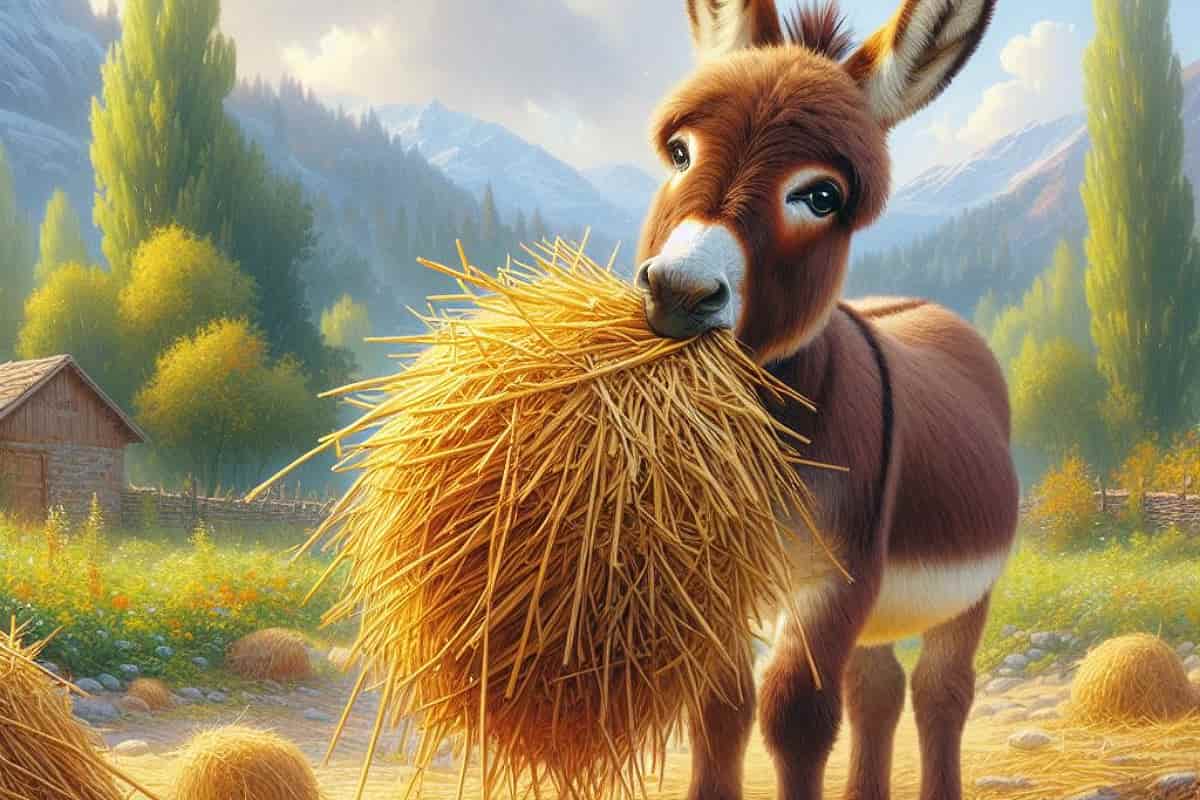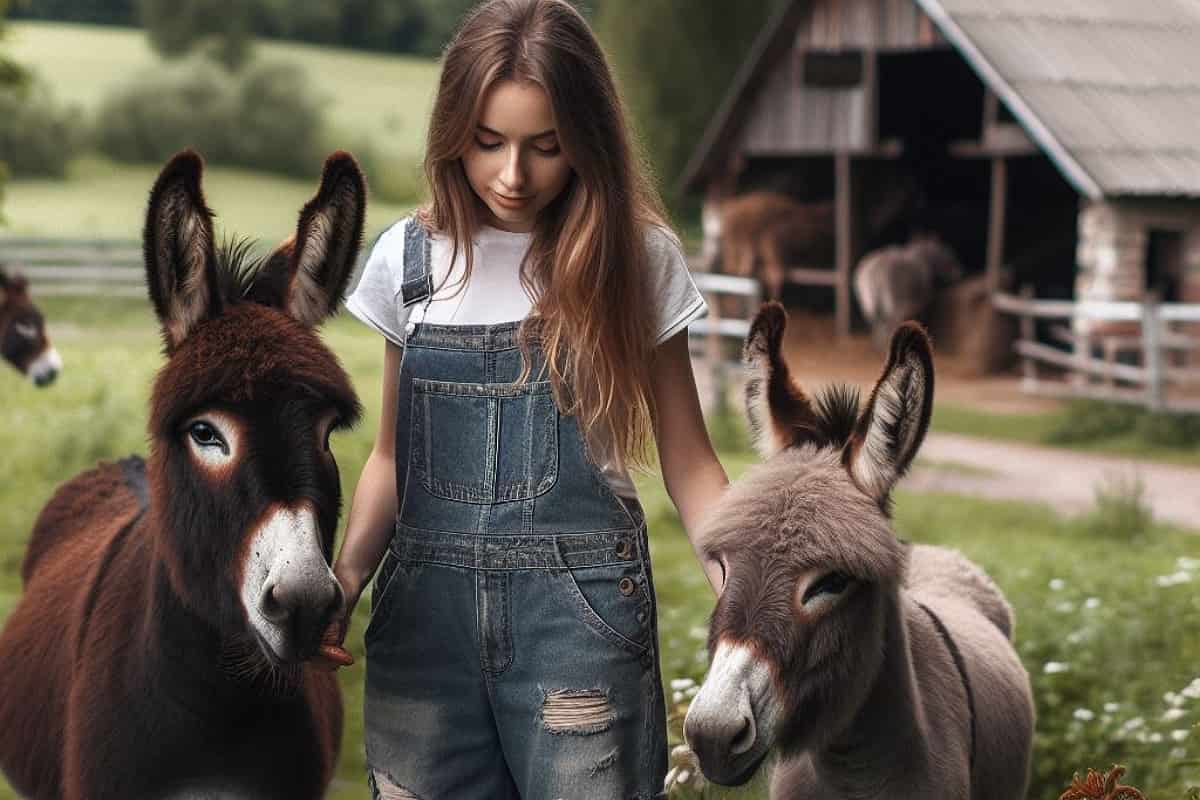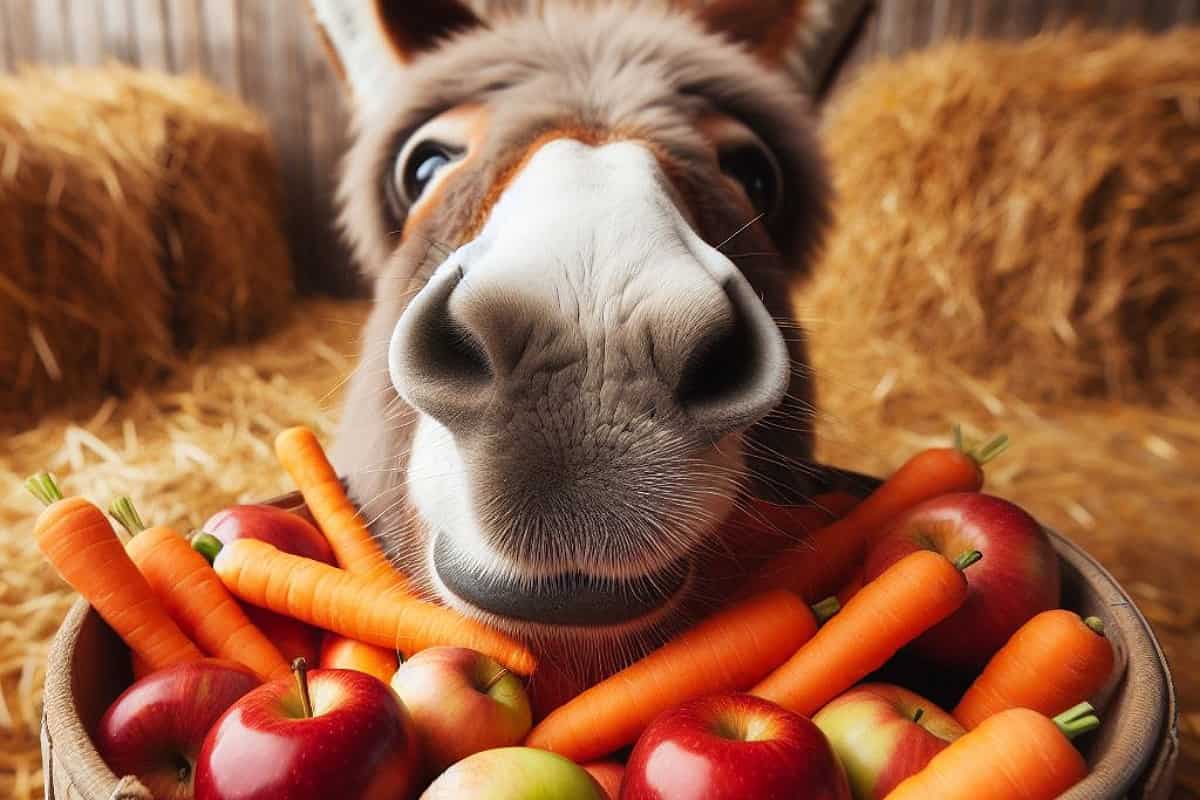What is the donkeys diet? Greetings, donkey enthusiasts! Today, we embark on an exciting journey to uncover the nutritional needs of our beloved donkeys. Understanding what these incredible creatures eat is not only vital for their overall health and well-being but also fascinating from a natural history perspective. So, let’s dive in and explore the donkeys diet of these gentle equines!
1. What Do need for a Balanced donkys Diet?
As responsible caretakers of donkeys, it is essential for us to provide them with a well-balanced and nutritious diet. Donkeys are herbivores, meaning donkeys diet consists primarily of plant material. To ensure they receive all the necessary nutrients, their meals should include a variety of components.
A. The Importance of Forage in donkeys diet:
Forage plays a crucial role in a donkey’s diet. High-quality grass hay, such as timothy or orchard grass, should make up the majority of their forage intake. It provides the necessary fiber, vitamins, and minerals that keep their digestive system functioning optimally. Additionally, offering access to pasture grazing allows donkeys to mimic their natural feeding behavior.
B. Concentrates and Supplements in donkeys diet:
In addition to forage, donkeys may require concentrates and supplements to meet their specific nutritional needs. These supplements can include pelleted feeds formulated specifically for donkeys, which provide additional vitamins and minerals. However, it is important to consult with a veterinarian or equine nutritionist to determine the appropriate type and amount of concentrates for your donkey.
C. Fresh Water in donkeys diet:
Water is an essential component of a donkey’s diet, just like any other animal. Clean and fresh water should always be readily available to ensure proper hydration and overall health.
2. What Do Donkeys Eat in the Wild?
Donkeys have a fascinating history as wild animals before their domestication. To gain a deeper understanding of their nutritional needs, it is crucial to explore what they eat in their natural habitat.
A. Grazing Preferences of donkeys diet
In the wild, donkeys are opportunistic grazers and have a preference for certain types of vegetation. They tend to favor grasses, herbs, and browse plants. Their grazing behavior helps maintain biodiversity by consuming different plant species, which prevents overgrazing and benefits the ecosystem.
B. Adaptability to Harsh Environments _ donkeys diet
One remarkable aspect of wild donkeys is their ability to adapt and thrive in harsh environments with limited resources. They can survive on sparse vegetation and even consume thorny shrubs when necessary.
do you know about buffaloes?

3. What Do Domesticated Donkeys Eat to Thrive?
Domesticated donkeys rely on us to provide them with a suitable diet for Donkeys that meets their unique needs. Let’s take a closer look at the key components of a domesticated donkey’s diet.
A. Quality Hay of donkys diet:
One of the mainstays of a domesticated donkey’s diet is high-quality hay. It should be clean, free from mold or dust, and consist of a mix of grasses and legumes. Hay provides the necessary fiber and keeps their digestive system in top shape.
B. Pasture Grazing:
Access to pasture allows domesticated donkeys to engage in natural grazing behaviors, providing them with mental stimulation and additional nutrients. However, it is important to carefully manage their grazing to prevent overconsumption and maintain pasture health.
C. Nutritious Treats in donkys diet:
We all love to spoil our donkeys with treats occasionally! While treats should be given sparingly, there are some healthy options that can provide additional nutrition and serve as a form of positive reinforcement during training. Carrots, apples, and small amounts of low-sugar horse treats are popular choices.

Conclusion:
Understanding the nutritional needs of donkeys is essential for their overall well-being. By providing a balanced diet consisting of high-quality forage, appropriate concentrates, fresh water, and occasional treats, we can ensure our donkeys thrive under our care. Remember to always consult with professionals to tailor the diet to your specific donkey’s needs. Let’s keep our four-legged friends happy, healthy, and nourished!
A Comprehensive Guide to What Do Donkeys Eat
Donkeys are fascinating and unique creatures, but have you ever wondered what they eat to stay healthy and happy? In this comprehensive guide, we will uncover the nutritional needs of donkeys and provide you with all the information you need to ensure a well-balanced and fulfilling diet for your furry friends.
Understanding the Basics
Before we dive into the specifics of donkey diets, it’s important to understand some basic principles. Donkeys are herbivores, which means their diet is primarily plant-based. However, their preferences and nutritional requirements can vary depending on various factors such as age, activity level, and overall health.
The Role of Forage in donkeys diet
Forage plays a vital role in a donkey’s diet. It refers to a combination of grasses, hay, and other edible plants that provide essential nutrients and promote digestive health. Donkeys should have access to good-quality forage at all times to maintain optimal health.
The Importance of Fiber in donkeys diet
Fiber is a key component of a donkey’s diet. It aids in digestion and helps prevent common issues like colic and obesity. Donkeys should consume around 1-2% of their body weight in fiber-rich forage each day. This can be achieved through a combination of pasture grazing and hay feeding.
Decoding the Dietary Preferences of Donkeys
Now that we understand the basics of a donkey’s diet, let’s take a closer look at their dietary preferences. While forage should make up the majority of their diet, donkeys can also benefit from certain additional food sources.

The Power of Pasture
Pasture grazing is a natural and preferred way for donkeys to consume their daily intake of nutrients. It allows them to engage in natural behaviors while enjoying the fresh air and exercise. However, it’s important to ensure that the pasture is free from toxic plants and kept clean to prevent the risk of parasites.
Supplementing with Hay
In addition to pasture grazing, hay can be an excellent source of nutrition for donkeys, especially during the winter months when fresh grass may not be readily available. Good-quality hay, such as timothy or orchard grass, should be provided to supplement their diet.
The Role of Grains
While donkeys do not require a significant amount of grains in monkeys diet, they can benefit from small portions as a supplement. Whole grains like oats or barley can provide additional energy and essential nutrients. However, it’s important to avoid overfeeding grains, as it can lead to weight gain and other health issues.
A Closer Look at Optimal Donkey Diets
Now that we have explored the nutritional preferences of donkeys, let’s delve into how we can enhance their health and overall well-being through optimal diets.
Balancing Nutritional Needs
Ensuring a well-balanced diet is crucial for donkey health. This means providing a combination of good-quality forage, supplemented with hay and appropriate amounts of grains if necessary. Consult with a veterinarian or equine nutritionist to create a customized diet plan based on your donkey’s individual needs.
Regular Dental Care
Donkeys have unique dental anatomy that requires regular attention. Overgrown teeth can hinder their ability to chew and digest food properly. Routine dental check-ups and floating, a process that smooths out sharp edges on the teeth, are essential for maintaining optimal oral health and facilitating proper digestion.
Hydration Matters in monkeys diet
Proper hydration is vital for donkeys’ overall well-being. Always ensure access to clean and fresh water, especially during hot weather or when engaging in physical activities. Donkeys should consume around 5-10 gallons of water per day, depending on their size and environmental conditions.
Monitoring Body Condition
Regularly monitoring your donkey’s body condition and weight is important to ensure they are neither underweight nor overweight. Consult with a veterinarian to learn how to assess their body condition score and make any necessary adjustments to their diet or exercise routine.
By understanding the nutritional needs and dietary preferences of donkeys, we can provide them with the best care possible. Remember to always consult with professionals to create an individualized diet plan for your donkey, and enjoy the rewarding journey of keeping these lovable creatures healthy and happy!
FAQ – What Do Donkeys Eat? A Hearty Exploration of Donkeys Diet
-
- Q: What do donkeys eat?
A: Donkeys are herbivores and primarily eat grass and hay. They also enjoy consuming fresh fruits and vegetables as treats.
-
- Q: Can donkeys eat carrots?
A: Yes, donkeys can eat carrots. Carrots are a healthy and tasty snack for them. However, it’s important to feed them in moderation to maintain a balanced diet.
-
- Q: What types of hay are suitable for donkeys?
A: Donkeys can be fed different types of hay, including grass hay, such as timothy or orchard grass hay. Avoid giving them alfalfa hay as it is too rich in protein and calcium.
-
- Q: How much water do donkeys need?
A: Donkeys require access to fresh, clean water at all times. They should drink approximately 5-10 gallons of water per day depending on their size, age, and activity level.
-
- Q: Can donkeys eat oats?
A: Donkeys can eat oats, but they should be given sparingly as they are high in carbohydrates. Oats can be used as a treat or supplemental feed, but should not replace their primary diet of hay and grass. read about buffaloe